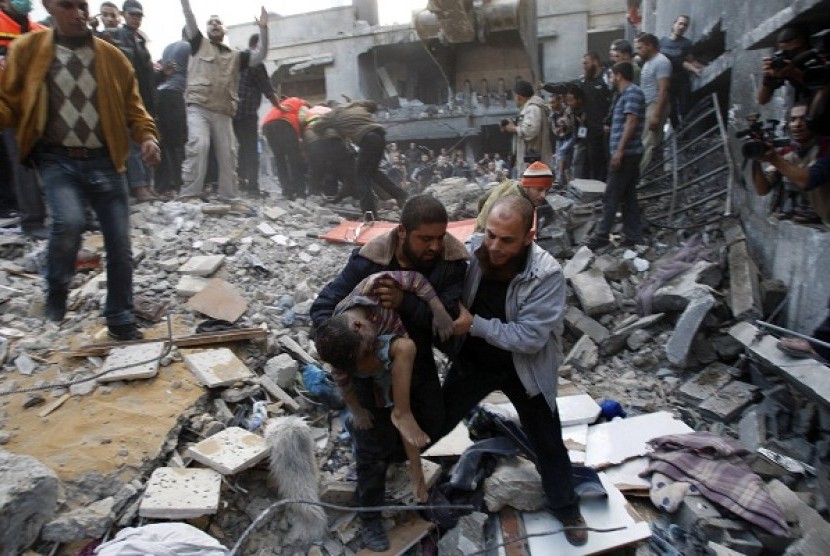REPUBLIKA.CO.ID, GAZA CITY - Israel's new offensive against the Gaza Strip has turned into a political bonanza for the territory's Hamas rulers, while sidelining Palestinian President Mahmoud Abbas, their Western-backed rival in the West Bank.
Gazans feeling unfairly attacked by Israel have been watching with gleeful pride as Hamas militants fire rockets deeper than ever into Israel and Arab leaders flock to previously isolated Gaza to show solidarity. Growing collateral damage from Israel's massive aerial bombardments of Hamas targets does not appear to have hurt the Islamists' sudden popularity.
Saed Moaserji, a 19-year-old engineering student from Gaza's Jebaliya refugee camp, said he felt intense pride after Hamas rocket squads for the first time this week targeted Jerusalem.
"I never liked Hamas, but I wished I could kiss the forehead of the one who fired the rocket on Jerusalem," Moaserji said Saturday, standing outside a local Hamas commander's two-story home that had just been flattened in an airstrike.
Israel and Hamas have clashed repeatedly since Israel withdrew from Gaza in 2005. Four years ago, they fought a full-fledged three-week war initiated by Israel to stop rocket attacks from Gaza.
Since Wednesday, Israel has bombed Hamas' rocket launching sites, weapons depots and increasingly its symbols of power while Hamas fighters showered Israel with rockets. Dosens Palestinians and three Israelis have been killed and hundreds of thousands of people on both sides have seen their lives disrupted.
Sunday marks the first full work day in Gaza after a long holiday weekend. The Gaza government announced that schools would remain closed, but asked civil servants to report to their jobs. Streets have been fairly empty in recent days, but some shops were open.
The current mood in Gaza can quickly turn on Hamas, especially if fighting drags, the death toll rises or shortages are felt more keenly. But for now, Gazans seem to enjoy the rare feeling of keeping Israel off guard.
"Israel is more powerful, no argument about that," said Gaza City grocer Safwan Darwish, watching a Hamas TV station in his shop. "But this strong state which all Arabs fear found itself under the mercy of fire from Gaza."
Seeking U.N. recognition
The Gaza offensive came just two weeks before Abbas planned to seek U.N. recognition of "Palestine" — consisting of the West Bank, Gaza and east Jerusalem — as a non-member observer state. Israel captured those territories in the 1967 Mideast war.
Such recognition, likely to be approved by a majority of U.N. General Assembly members, would be largely symbolic but also protect the borders of a future Palestine against Israeli land claims through expansion of Jewish settlements.
However, the U.N. plan is now being overshadowed by the Gaza fighting.
"With the gravity and dramatic nature of the events in Gaza, this U.N. move will appear ... less significant and less attractive," said Ghassan Khatib, until recently a spokesman of Abbas' autonomy government, the Palestinian Authority. At the same time, the Gaza offensive "is making the Palestinian Authority less relevant and politically marginalized," he said.
Israel and the U.S. oppose the U.N. bid, saying it's an attempt to bypass negotiations, a charge Abbas has denied. He complained in a televised speech to Palestinians on Friday that the Gaza offensive is meant to undermine the U.N. recognition quest, but that he would go ahead and submit it on Nov. 29.


